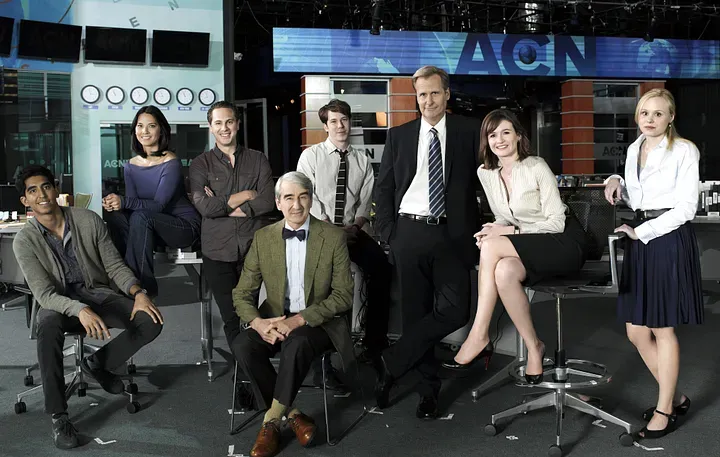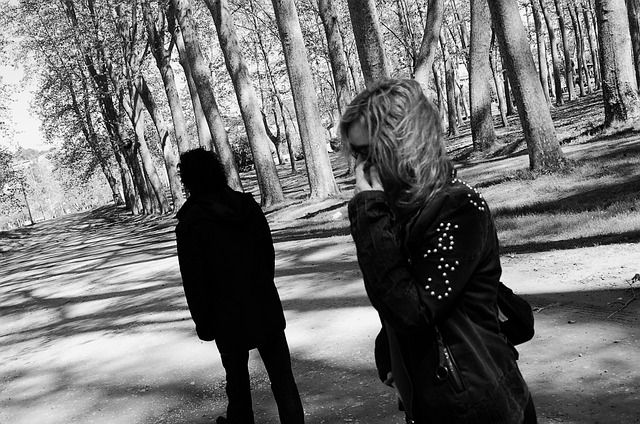Will McAvoy Isn't Real, But He Should Be

“I’m a registered Republican,” he says. “I only seem liberal because I believe hurricanes are caused by high barometric pressure, and not gay marriage.”
No, it’s not Bill Maher—who is unabashedly a registered Democrat, anyway—it’s the anchor of cable news network ACN’s nightly news show. His name is Will McAvoy, and he recently caused a stir among fans of the formerly staid and standard newscast when he gave a lengthy, expletive-filled explanation of why America is no longer the greatest country in the world.
“In case you wander into a voting booth one day,” he spat at a college student who asked him why America is the greatest country in the world, “there’s some things you should know, and one of them is that there is absolutely no evidence to support the statement that we’re the greatest country in the world.”
“We’re seventh in literacy, twenty-seventh in math, twenty-second in science, forty-ninth in life expectancy, 178th in infant mortality, third in median household income, number four in labor force, and number four in exports. We lead the world in only three categories: number of incarcerated citizens per capita, number of adults who believe angels are real, and defense spending, where we spend more than the next twenty-six countries combined, twenty-five of whom are allies. None of this is the fault of a 20-year-old college student, but you, nonetheless, are without a doubt, a member of the WORST-period-GENERATION-period-EVER-period, so when you ask what makes us the greatest country in the world, I don’t know what the fuck you’re talking about.”
Man off his rocker? Or someone just speaking the truth?
Either way, it may not matter, because Will McAvoy is just a character on Aaron Sorkin’s The Newsroom, now in its second season on HBO. Mr. McAvoy, played with earnestness by Jeff Daniels, is delightfully honest and human, a man on a mission to save America by reporting the news in an informative and truthful way because, as he sees it, it’s the only way to save America.
Will McAvoy isn’t real, but he should be.
Making the rounds on the news circuit is important to authors like Reza Aslan, whose newest work, Zealot: The Life and Times of Jesus of Nazareth, came out in July. While everyone knows Fox News on cable is a bastion of fair and balanced reporting, no one suspected that the interview would mostly consist of one embarrassing question.

Mr. Aslan’s book focuses on the historical time in which Jesus lived, and the political and religious state of the region in which he made his case for his identity, launching from there to look at the man himself. Lauren Green, who interviewed him on the conservative news channel, wasn’t interested in any of that. She only had one query. “Now, you are a Muslim, so why did you write a book about the founder of Christianity?”
Aslan was immediately on the defensive, having to explain his credentials (a Ph.D. in the history of religions, a degree in the New Testament, fluency in biblical Greek, and twenty years of scholarly research on world religions). That should have ended any discussion of “why write this book,” but Ms. Green continued on her one-track interview.
“But it still begs the question: why would you be interested in the founder of Christianity?”
On and on this goes, until Ms. Green decides to spend time on negative reviews of his book. It becomes clear that the only reason Mr. Aslan was invited to Fox News was to embarrass him for no reason other than the fact that he’s Muslim.
While that is probably one of the most uncomfortable interviews Fox News has done, it’s merely emblematic of the larger problem today’s journalism faces, and it’s one that comedian and former host of Comedy Central’s The Daily Show, Jon Stewart, was able to highlight when he made an appearance on CNN’s Crossfire nine years ago.

When invited to the show to discuss his book, America, he decided this was his chance to publicly shame the nation’s news machine, starting with hosts Paul Begala and Tucker Carlson. Mr. Begala and Mr. Carlson were the latest hosts of the debate show, which features conservatives debating liberals on current events, and has been on since 1982.
Unlike Ms. Green’s blindside of Mr. Aslan on Fox, Mr. Stewart did not pretend he was presenting news; his position on the show was clear. “You’re hurting America,” he told the pair. “You have a responsibility to the public discourse, and you fail miserably.” When Mr. Carlson claimed Mr. Stewart was the real softshoe interviewer, Mr. Stewart replied with disdain. “You’re on CNN! The lead in to me is puppets making prank phone calls! What is wrong with you?” But Mr. Tucker just didn’t get it.
In an unusual move that gave some hope for the nation’s news machine, Crossfire was cancelled not long after Mr. Stewart’s appearance. In a less unusual move, the show is making its return this fall. Why?

None other than Thomas Jefferson believed that a democracy depends on an informed populace. “If a nation expects to be ignorant and free, in a state of civilization, it expects what never was and never will be,” he said. He was a firm believer in education being a prerequisite for voting.
But we’ve come a long way since Jefferson. Today’s political and social climate is one that often promotes ignorance above intellect, and the news organizations that inform us go along with that. A politician’s penis makes more headlines in New York City than the nation’s erosion of liberty. Our elected officials, whose salaries we pay, are allowed to dodge our questions and disobey us, when we are their bosses. National discourse on issues amounts to shouting matches instead of serious discussion that isn’t so charged with emotions.
Intellectual debate is now derided rather than celebrated as a cornerstone of our constitutional process. Politics is now a sport, with sides that have zero interest in the good of the people, or the will of the people, and have only to do with winning points and governing the people, in ways we don’t consent to.
So America isn’t the greatest country in the world? Mr. McAvoy goes on to explain where we came from, which may be a map showing how to get back there.
“We sure used to be. We stood up for what was right. We fought for moral reasons. We passed laws, struck down laws for moral reasons. We waged wars on poverty, not poor people. We sacrificed, we cared about our neighbors. We put our money where our mouths were. And we never beat our chest. We built great big things, made ungodly technological advances, explored the universe, cured diseases, and we cultivated the world’s greatest artists and the world’s greatest economy. We reached for the stars, acted like men. We aspired to intelligence, we didn’t belittle it, it didn’t make us feel inferior. We didn’t identify ourselves by who we voted for in our last election. And we didn’t… we didn’t scare so easy. We were able to be all these things, and to do all these things, because we were informed. By great men, men who were revered. First step in solving any problem is recognizing there is one. America is not the greatest country in the world anymore.”
Mr. McAvoy’s mission on the show is to change his newscast to one that actually informs the populace, that challenges the notions of sensational journalism and trades up for real news, calling out lies when he sees them and working for a real, good cause. Along the way he pisses off the parent company that owns his network, but that doesn’t stop him or his cohorts.
That’s what we need in the real world. Instead, we get Crossfire. But in a way, Mr. Sorkin’s Newsroom, which uses real events as the backdrop for its fictional newscast, is “News Night 2.0,” which Mr. McAvoy’s team covertly calls the broadcast. Even if it’s fiction on an HBO show, those who watch it can still see recent events in the light of what such a newscast would be, were it real.
Maybe that’s a start.
Sure, America isn’t the greatest country in the world anymore. But it can be.




Comments ()